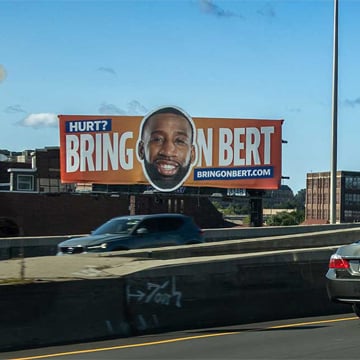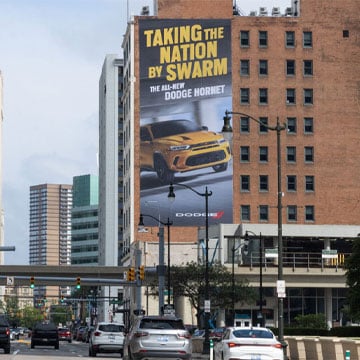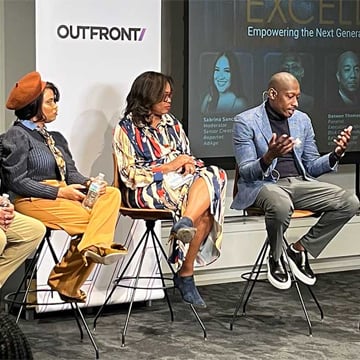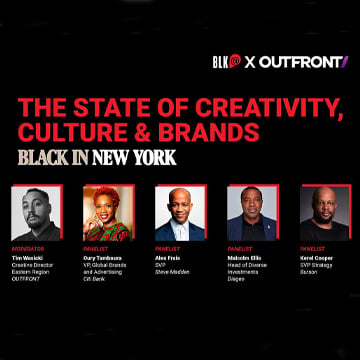
Black@ Presents “The Bigger Picture” at Detroit’s AfroFuture Event
August 28, 2025
After hosting the organization’s last panel at our headquarters in New York City, OUTFRONT once again partnered with Black@ to elevate important conversations in Detroit earlier this month during AfroFuture, which bills itself as “more than a festival” but instead a “global celebration of Black innovation, culture, and community.”
Over the course of the day’s forum, entitled “Blk @ Present The Bigger Picture: Take-XI Detroit,” thought leaders converged to share their insights – and we were there to capture them. Here are a few powerful thoughts shared on our stage.
Detroit: Where Creativity, Content, Tech, and Culture Converge
Chanel Domonique, Founder, The CDM Collective/COO, Iced Up Records
We continue to press and never stop pressing what this [Detroit hip-hop] sound meant to us…my artist Bezel was the first Detroit rapper signed to Motown Records. Motown Records has been an establishment since before I was born. He signed in 2018…now did we have the professional backing or the professionalism of managers, labels to sustain that talent? Probably not in the beginning. So it took a lot of growth and different areas that came again from rejection. You tell us “no” in Detroit, we're going to keep going. We're going to create what we want to be in that ecosystem. We're not going to conform to what you may look at as success.
Amber M. Lewis, Founder + Chief Creative Officer, Social N The City
We created what the modern “American music sound” sounds like…we don't really get the recognition for it globally, our influence on trends, on culture…so when I'm traveling to other cities, to other countries representing Detroit, I'm always putting Detroit on my back because I need you to know that we're here…I need them to know that we're here, what we look like, what we sound like, what we feel like the experience of a Detroit person. So then we can get that kind of recognition that we deserve.
Lester A. Booker Jr., Former Vice President, Head of Diversity & Inclusion Communications, Citizens
I think the biggest thing from a brand perspective is knowing your audience, right? Knowing the culture, knowing that its business is a relationship. You want the community to resonate with what the business is doing. So again, being able to take the time to get into the community, take the time to learn what's going on, take the time to invest back in the community with those partnerships and content creators. Some of the brands I've been able to work on, we've been to be part of the heartbeat of the city, bringing those folks together and being able to say, OK, this is a Black small business. There's an opportunity here for growth and there's an opportunity here for us really to get the word out on what's going on. I think the biggest thing being a person of color in the room, you really have to help these organizations and help folks understand the business.
The Intersection of Music, Culture, and Brands
Krysty Sagnia, Managing Director, McCann Detroit
When I think of the conversations that we have and how we work every day to push clients out of their comfort zone... I have worked on brands like Chevrolet and Ford that are very, very much rooted and who we are as America and how now you need to start talking to other audiences. Those were actually risky conversations, right? They were risky in the sense of you need to not just have a big TV ad, you need to be in the community…And so there were always moments where you're sitting with these brands and helping them to understand who at the end of the day is buying that vehicle…there are risky conversations with big brands like that every day. The key? — Being in the room, having someone in the room that's not afraid to have that conversation.
Christen Rochon, National Account Director, NBC Universal
TikTok is a great example on of how you can get out into the ethos of social media and try a trend. It then graduates to your Instagrams, to your Youtubes for storytelling and then multiplies from there. I think utilizing multiple platforms is important and you definitely cannot just rely on one.
Addofio Addo, Director of Business Development, Bedrock Detroit
I'd say between [artistic integrity and commercial opportunity], there's something that's really important in the middle, which is essentially is the intention. If you have the right intention …as commercial success grows, you actually lend yourself room to help someone. A young creator, someone who has the intent to grow something from start to finish. Most folks kind of miss the intention piece…What audience does this go to? What does that audience actually care about? Don't take it from the surface level, go more granular, go deeper.
The Impact of Creativity in the Black Community
Jason Mercer, Principal, Cleveland Avenue
We're here in Detroit. We have so many large Black companies like Benny Johnson's automotive supplier company…When you have those type of large businesses within the community, they have a multiplier effect. Those people create jobs. Those jobs go to taxpayers, taxpayer dollars go to our schools, so on and so forth. Where that comes into what we're talking about for the creative side of things. It's those creatives, those people that do content that really have those ideas that create and breed those new businesses…And when you have that pairing of communities, Black, brown or whatever, creating new businesses, creating new jobs, creating wealth, it flows it to the community at a whole as that multiplier effect downstream.
Talitha Johnson, Director of Communications at Downtown Detroit Partnership
On a local level, I would say that the businesses and the small businesses here hold a lot of our culture. So that's anywhere between our legacy businesses, preserving the culture of our food…so many businesses that have been around and so many that are opening not just downtown and throughout the city as well, but also to the creative class too. There's a creative economy.
Fran Westbrooks, President and Managing Partner, Boulevard
It's that is the power of ownership, that being able to be patient and be strategic and think... not just for a quarter. And I understand a lot of us are struggling and sometimes you don't have enough bandwidth to think past this week. But if you can push through that and create a plan…we have to really start to understand what connecting the dots mean and we oftentimes don't even seek out that information.
Justin Norman, Director, Global Creative Strategy, Spotify
When you do a festival like AfroFuture in Detroit, you're also showing that it's possible to do a lot of these different parts in the music business that people don't know about you. There are back-end parts of the music business that people are unaware of. There are front-end parts of the music business that people are unaware of beyond being an artist. There's a whole bunch of components that go into tour management, festival artist management, and the like where you could build an entire industry just around that. That needs to be a more apparent thing to folks in a lot of different creative spheres.
Deadra Rahaman, EVP Client Partnerships and Strategy, Hero Collective
One of the things that's important with a lot of these “industry” conferences is that they all serve a purpose, not necessarily saying that their purpose is less important. Some are just here to celebrate Black creativity, right? Some are here to celebrate the ingenuity…Black week is trying to move the bar. So I think when we start to look at these conferences, we have to really look at like, what are we getting out of it?
The Influence of Culture (Music, Art, Fashion)
Aba Blankson, Chief Marketing and Communications Officer, NAACP
African Americans, Black people globally create culture. We are culture everywhere we go. And there's an economic value to the culture that we create. A lot of it comes from a place of innovation, creativity. Some of it comes from pain, some of it comes from trauma. It comes from a lot of different places. And we know that often times people, as we say, they want our rhythm but not our blues. And we know also that when Black creatives are involved, there is, according to a study that Nielsen did, 1.5 to 10x more value when African and Black creatives are involved in terms of media value for a project. When we say we own culture and we create culture and we give culture to the world, that is not a throwaway statement. We are that, and we should own that unapologetically every single time.
Dr. Reze Bonna, Co-Director, Bonna Diesenhaus Group
In 2019, the NAACP took 300 African Americans to Ghana…we got questions like, well, why are you taking African Americans to Ghana?…Going to Ghana and having them see the business opportunities, having them see that they are reflected in the country, coming back with all of these ideas. People are now doing real estate. It just opens up the world. It's not just that one country. Now they're thinking about Rwanda.
DJ Obi, DJ/Founder, Obi’s House
You never know, you might be sitting next to your million-dollars – you might be sitting next to your next contract, your next record deal…There's so many artists that come there [the party]. Yes, they're coming to a party, but a party is the best atmosphere to break the ice to meet someone who might be serious…in the office on a weekday you might not get to talk to them. So you always have to be prepared with your elevator pitch, to pitch yourself and get that going…That's how we start taking a little piece of us and leaving it everywhere else.
Power In Partnership: Diaspora-Led Infrastructure for Africa’s Next Leap
Timi Adeyaba, Co-Founder | COO, Amplify Africa
Sometimes long-term relationships…might not actually flourish immediately…never just let it go just because someone isn't responding or because the conversations haven't just happened. I think we've all been in that situation where you've been talking to someone, you're like, “Oh, we got to work together, we got to do something together.” And the click just doesn't work at that moment…at the end of the day, it's really all about just connecting. Just don't think because it doesn't work at that time, the opportunities wouldn't happen eventually.
Jennifer Onwenu, Host, Talk Show “Ask Jenn”
You learn a lot about a founder of a business, company, creative, what have you, … through the power of storytelling. If you like somebody, you will like their product. There have been so many companies or so many people that I have amplified on my platform…and they tell me the amount of referrals that they've gotten. They tell me the amount of people that have patronized their business, or someone connects someone with something that they heard in an interview that I did…Just recognizing the ability and storytelling and recognizing again, yes, these are businesses. Yes, there are dollars, yes, there are investors, but they're all humans behind this.
Farai Gundan, Founder, Bhadala
I always knew that ownership was actually part of our DNA as Africans or African Americans. We've always known that we have to own the value chain, so we're not consumers. We built our solution, deployed in South Africa where we wanted to get early learnings. Now across the continent of Africa you have a lot of underbanked and unbanked folks. And so M-PESA pioneered a mobile money which is now really across the continent. And so having those early learnings, we actually came back to to Detroit and responded to an RFP and we won a contract with the City of Detroit, half a million to actually build a single payment platform for multimodal transit.
Ken Agyapong, Co Founder + CFO, AfroFuture
So that's what the main purpose of the festival is. We always wanted to make sure we connect people…I think one thing about the African culture and even the Black culture as well, people like to keep things to themselves. But it doesn't make sense to keep everything to yourself. If you believe in what you're doing, give the resources to others too, and let them flourish.
Author: Jay Fenster, Marketing Manager @ OUTFRONT
Links to third-party content are not endorsed by OUTFRONT Media. Past performance may not be indicative of future results. OUTFRONT does not guarantee specific results or outcomes.



